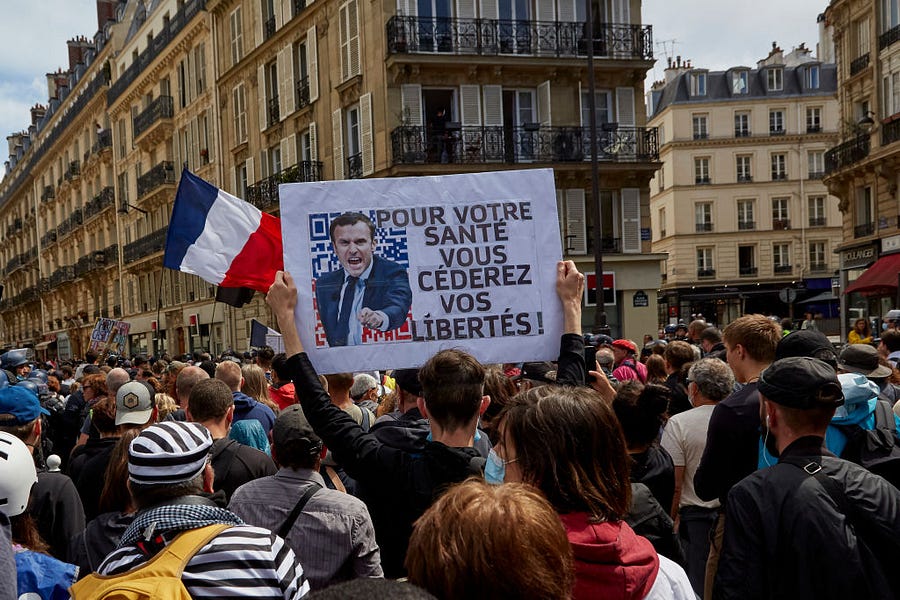“Non au pass sanitaire!” The signs in the streets of Paris speak a clear language—“No to health passes”—as thousands opposed to the government’s implementation of COVID-19 health passes descend on the streets. More than 200,000 people nationwide have protested on a weekly basis against measures that prevent those without a valid QR code from entering restaurants, bars, and health care facilities, or using trains, buses and planes. Even outside dining is subject to rules, and in recent days, videos have circulated social media showing French police officers checking the passes of customers on terraces around the country.
French President Emmanuel Macron has responded to the protests by hosting Instagram livestreams, answering questions, and encouraging citizens to be vaccinated (to date, about 35 million French residents have been fully vaccinated, out of a total population of 67 million). Secretary of State Clément Beaune told a French news channel that “We must not give undue importance to a violent minority.” But as the protests expand in size as restrictions on unvaccinated people increase, the government rightfully fears a “Yellow vest” style movement that could take much bigger proportions.
Much like the European Union’s interoperable COVID-19 passport, the French health pass allows citizens to go about their business in three scenarios: having been vaccinated by European Medical Agency-approved vaccines, having recently been tested for the virus, or having recently recovered from COVID-19 (the standard length in Europe is three months since the certified beginning of the infection).
In Germany, Chancellor Angela Merkel’s suggestion that vaccine passports might go beyond pubs and bars and become the norm for most public activity has sparked protests across the country. The protests themselves have been deemed illegal because organizers were unwilling to agree to the mandatory COVID mitigation requirements. Still, in a recent protest in Berlin, 5,000 people participated, 600 of whom have been arrested.
Meanwhile in Italy, where the government has implemented similar rules to the ones in France, thousands have participated in unauthorized protests as well. Italian rules require a green pass to visit a bar, restaurant, cinema, or museum. Prime Minister Mario Draghi has called some of the support from opposition politicians for these protests “an appeal to die.” That said, the measures seem to have worked better than simple appeals by the government to get vaccinated: Since the introduction of new restrictions, vaccination demand has seen an uptick of 200 percent in some regions of Italy.
Opposition to COVID-19 passports varies across Europe, as do both policies and overall views on vaccination. Denmark was an early adopter of the measure and saw little resistance. The Netherlands has no significant resistance to the COVID QR codes because it is required only at some select events, and despite the introduction of a mobile app, even the country’s biggest airport in Amsterdam has yet to actually start using it. The Dutch government was also late in implementing mask mandates, and has since abolished them again in all places but public transport.
According to the European Centre for Disease Prevention and Control, 85 percent of Dutch residents have received at least one dose of a COVID vaccine, compared to 82 percent in France, 76 percent in Italy, and 74 percent in Germany. The island state of Malta has the highest vaccination with 87 percent, while the lowest rates are observed in the East, with Romania (31 percent) and Bulgaria (20 percent).
The EU’s “interoperable” COVID pass makes sure that all vaccination, recovery, and test certificates in the EU are recognized by each other. The measure was intended to avoid quarantine for intra-EU travelers, but the European Commission has also noted that member states are free to use the tool for other purposes.
A notable difference between the opposition to COVID-19 passports in Europe, compared with the United States, is that in Europe the confrontation is largely between the unvaccinated and the vaccinated. To the unvaccinated, a practical mandate of vaccination creates a two-tier society which contradicts freedom of choice. To the vaccinated, the actions of those opposed create a hazard for everyone in society, which they view as a selfish act. The argument for personal privacy and against the power of law enforcement to ask for identification is not center-stage in the European conversation as it is in the United States.
Still, it’s a debate that could be going on for a while. The European Union’s vaccine passport guidelines are set to expire on June 31, 2022, though Brussels is expected to re-evaluate whether the measure is still necessary.






Please note that we at The Dispatch hold ourselves, our work, and our commenters to a higher standard than other places on the internet. We welcome comments that foster genuine debate or discussion—including comments critical of us or our work—but responses that include ad hominem attacks on fellow Dispatch members or are intended to stoke fear and anger may be moderated.
With your membership, you only have the ability to comment on The Morning Dispatch articles. Consider upgrading to join the conversation everywhere.